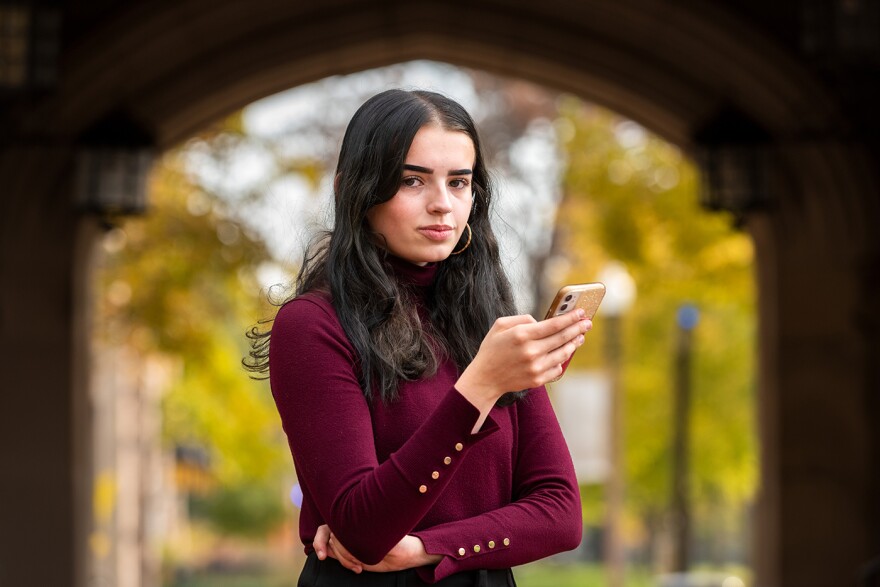As a young adolescent, Emma Lembke remembers being frustrated — even angered — by her parents’ hesitation over social media. She also began to feel left out as she interacted with peers who were often glued to their phones.
“I always asked myself, ‘Why are my friends opting to look down and keep their eyes down instead of looking up at me when we can have a plentiful, very fruitful conversation?’” Lembke recalled to St. Louis on the Air.
When she finally persuaded her parents to let her join Snapchat, Twitter and Instagram in sixth grade, she remembers being among the last of her friends to do so. But soon, she sensed her mental health deteriorating. She was spending four to five hours a day on the apps, scrolling and scrolling — and following as many people as she could.
“I really did buy into this myth [that] your social life can be fully kind of amplified, [that] if you go on these apps, you have this entire universe, this ‘metaverse’ per se, of connections out there, and they're waiting for you,” Lembke explained. “I bought into that false narrative.”
Within three years of entering that digital realm, Lembke reached a breaking point — and started removing social media apps from her phone. Online, she had experienced “really intense isolation” as a young girl and as someone with anxiety disorder and OCD.
“I didn’t understand that by entering these digital spaces, I was putting myself in opportunities where they could get worse,” Lembke told host Sarah Fenske on Friday’s show. “I was never warned [about] that.”
The unrealistic and harmful body standards hit her particularly hard.
“When I first got on there, I remember I followed, like, Olive Garden to Kim Kardashian, because it felt like the world was my oyster. Looking back, though, what that meant was [that] a month from then I would see these pictures of Kim Kardashian, edited,” Lembe said. “And I would see that and try to impose that body standard on myself. So that was a really, really dangerous kind of environment that I let myself into.”
Lembke became so concerned by social media’s impacts that, in addition to drastically reducing her personal use, she began to research the larger issues for a leadership program at her school in Birmingham, Alabama. As she explored existing answers to questions like “Is social media bad?” and dug into the nature of algorithmic systems, she found a bunch of helpful information. But something major was missing.
“I found out that there are not a lot of teen voices in the space, and I thought that was problematic,” Lembke explained. After all, she and her peers have grown up with social media in a way that previous generations had not — “and are the generation that is going to have to work to mitigate the harms.”
Now a 19-year-old, first-year student at Washington University in St. Louis, Lembke turned her school project into something bigger several years ago: Log Off. The nonprofit organization is on a mission to “further dialogue about the multifaceted nature of social media and promote the healthy use of it.”
While Lembke is Log Off’s founder and remains involved as an adviser, she’s now turned the CEO reins over to a younger teen — and begun a spinoff project aimed at policy change, called Tech(nically) Politics.
One of the changes Lembke is pushing for? “Safer, more humane algorithms.”
“We live in a society where you can’t put the genie back in the bottle — there’s no way that we’re going to go back to a space, in my opinion, where social media is not going to be the most used space to connect with other people,” the political science major said. “So how can teens right now — members of society that have dealt with social media the most [because] it’s been baked into the DNA of their generation — how can we take our stories and our testimonials and then push to have those safer spaces created? Because we are the ones that truly understand our own needs.”
Lembke noted that older generations in power don’t have the same insight into what’s at stake.
“I wish that I knew a time when I could be bored,” she said. “[My] mom would say, ‘I used to jump off the roof of the umbrella playing Mary Poppins with my siblings.’ And that’s so outlandish to me, because I can’t even imagine having that time to just think of those creative outlets and to think of doing that.”
Lembke pointed to the ability to “have something right next to me at all times to grab and go to when I’m bored” as a real concern for her generation. But she also struck a note of hope.
“We need to have conversations regarding healthier usage [and about making] these places safer, so that each individual can make that decision and can put in those levels of friction between themselves and addictive algorithms,” Lembke said.
Her focus right now is collecting video testimonials from fellow teens to share with policymakers as she pushes for better, smarter regulation of apps.
“What we’re looking for is really to engage with communities, schools and parents — and anyone else who wants us to help get those stories — [and then] put them together so that we can create this narrative that teens are not just passive victims, but they can be active participants.”
“St. Louis on the Air” brings you the stories of St. Louis and the people who live, work and create in our region. The show is hosted by Sarah Fenske and produced by Alex Heuer, Emily Woodbury, Evie Hemphill and Kayla Drake. Jane Mather-Glass is our production assistant. The audio engineer is Aaron Doerr.







